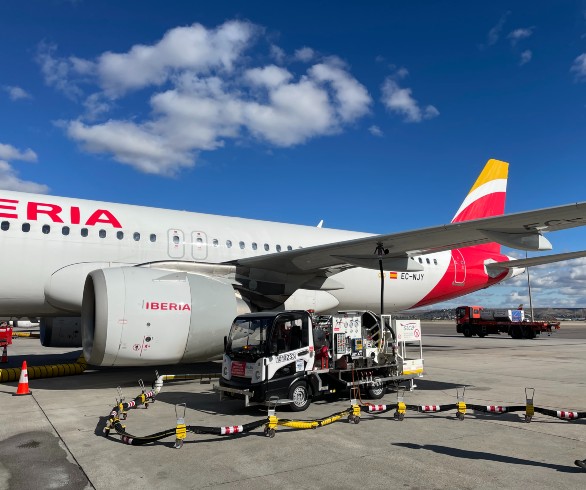Spain – With the operation of the first long-haul flights using biofuels produced in Spain from waste from the agrifood industry, Repsol and Iberia have taken another step forward to reduce emissions in the aviation sector.
The biojet in question was part of a batch produced in 2021 at the Repsol Group’s Petronor refinery in Bilbao, northern Spain. The first flight to use biofuel was on the Madrid-Washington route, and it was a twin-engine Airbus A330-200 plane, which has a capacity of 288 passengers and is one of the airline’s most fuel-efficient planes. This version of the A330-200 MTOW 242 TN has a maximum take-off weight of 242 tons, uses 15% less fuel than the fleet it replaces, and is thus more environmentally friendly.
The second flight will be IB6193 from Madrid to San Francisco, which Iberia is resuming following the pandemic, and the third will be Iberia’s first flight from Madrid to Dallas, which will depart at 15:55. Both are also operated by the Airbus A330-200 fleet. Thanks to the improved fuel efficiency provided by the fleet used and the use of the sustainable biofuel, Iberia and Repsol have reduced 125 tons of CO2 emissions into the atmosphere with these three flights.
Sustainable aviation
This initiative is part of Repsol and Iberia’s collaboration agreement for more sustainable mobility, which was signed in July and is in line with the United Nations’ Sustainable Development Goals (SDGs) promoted through the 2030 Agenda. Since then, the two companies have worked together on the AVIATOR project to investigate the impact of aviation emissions on airport air quality; in November, they flew the first Madrid-Bilbao flight using sustainable waste fuel; and in January of this year, Iberia joined the SHYNE consortium (Spanish Hydrogen Network), led by Repsol, to accelerate the development of green hydrogen in Spain.
A roadmap for the promotion of sustainable aviation fuels (SAF) for the coming years is included in Repsol and Iberia’s strategic agreement. Iberia and Repsol are already ahead of the European Union’s target of incorporating 2% SAF by 2025, as part of the Fit For 55 package. Flights to Washington, Dallas, and San Francisco now include a 2% surcharge.
Iberia and Repsol will launch new flights in the future that will use a higher percentage of biofuel blends, up to 50%. This product will be manufactured in Spain’s first advanced biofuels plant, which is set to open in Cartagena in 2023. Repsol and Iberia also plan to use synthetic SAF (e-fuel) produced at the Petronor complex in Bilbao in 2024. Both firms are also working on a project to use HVO (hydrotreated vegetable oil) in airport service vehicles.





